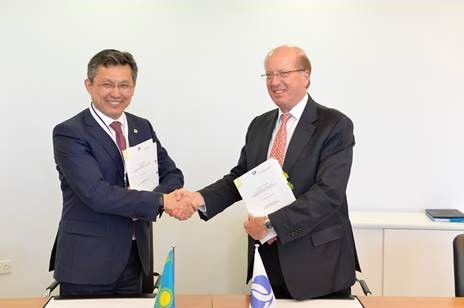ASTANA – Climate change is affecting rainfall and water availability in Kazakhstan. The European Bank for Reconstruction and Development (EBRD) is joining a strategic programme to significantly upgrade irrigation systems in the nation and is planning to provide $180 million for the project together with the Kazakh government, which will add $21.4 million from the country’s budget.
“Green” and “resilient” are two of the qualities of a modern economy, according to the EBRD’s new transition concept, noted First Vice President Phil Bennett, who, along with Kazakh Minister of Finance Bakhyt Sultanov, signed corresponding loan agreements at the bank’s annual meeting in Nikosia, Cyprus on May 9.
“Providing sustainable and climate-resilient irrigation to rural areas in Kazakhstan will allow some of those places quite literally to blossom and create tens of thousands of jobs, including in small and medium-sized businesses. I am proud that we are involved in this vitally important programme with both our financial and policy engagement,” Bennett added.
“The EBRD has invested nearly $7.5 billion in the economy [during the entire period of its operation]. We are the leaders of reform implementation,” said Sultanov on the sidelines of the bank’s annual meeting.
He also emphasised the bank aims to promote reforms and noted the efficiency of its cooperation in Kazakhstan.
“The EBRD has been an important partner of Kazakhstan for many years of its development. We have been working together for 25 years. The Foreign Investors Council (FIC) operates under the Kazakh President and it was an initiator of many major reforms, not only in the oil and gas sector, but also in diversification of our economy. The EBRD President is co-chair of the FIC and he annually comes to Kazakhstan to participate in the Astana Economic Forum and the FIC meetings,” Sultanov said.
The new project will cover the Aktobe, Zhambyl and South Kazakhstan regions. Funds will be lent to Kazvodkhoz and the bank hopes to help the national water operator make the new irrigation systems financially sustainable in the long term. The EBRD is also working with the government on tariff reform.
Kazakhstan has an arid climate and its vast lands are mainly steppe and desert, making agriculture impossible without irrigation and water services. Neither system in the country is efficient and both have been in decline since the country’s independence at the end of 1991. Old canals lead to high levels of water loss and some areas which were previously suitable for agriculture can’t currently be used.
The country’s water network provides irrigation access to only 55 percent of Kazakhstan’s developed areas. Climate change can worsen the situation further.The EBRD loan and government funds will be used to construct new water connections and water meters and introduce up-to-date drip-irrigation technologies. The project is being implemented under the EBRD’s Green Economy Transition approach, which aims to increase the share of its green financing up to 40 percent by 2020.
The EBRD loan and government funds will be used to construct new water connections and water meters and introduce up-to-date drip-irrigation technologies. The project is being implemented under the EBRD’s Green Economy Transition approach, which aims to increase the share of its green financing up to 40 percent by 2020.Sultanov noted the project will increase not only the efficiency of irrigation systems, but will also benefit the social and economic situation in the regions.
Sultanov noted the project will increase not only the efficiency of irrigation systems, but will also benefit the social and economic situation in the regions.



